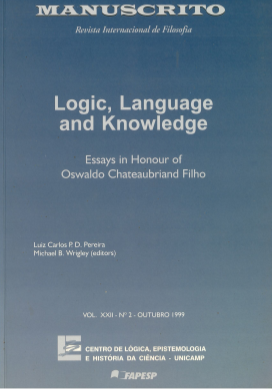Resumo
After some preliminar clarifications, arguments for the supposed asymmetry of supervenience and determination, such as they are, are shown to be unsound. An argument against the supposed asymmetry is then constructed and defended against objections. This is followed by explanation of why the intuition of asymmetry is nonetheless so entrenched, and of how the asymmetric ontological priority of the physical over the non-physical can be understood without the supposed asymmetry of supervenience and determination.
Referências
Bernardete, J. (1989). Metaphysics: The Logical Approach (Oxford, Oxford University Press).
Churchland, P.M. (1985). Reduction, Qualia, and the Direct Introspection of Brian States, The Journal of Philosophy, 77: 8-28.
Crane, T. (1991). Why Indeed? Papineau on Supervenience, Analysis, 51: 32-37.
Darden, L. & Maull, N. (1977). Interfield Theories, Philosophy of Science, 44: 43-64.
Depaul, M.R. (1987). Supervenience and Moral Dependence, Philosophical Studies, 51: 425-439.
Grimes, T.R. (1988). The Myth of Supervenience, Pacific Philosophical Quarterly, 69: 152-160.
Hellman, G. & Thompson, F.W. (1975). Physicalism, Ontology, Determination, Reduction, The Journal of Philosophy, 72: 551-564.
Hellman, G. & Thompson, F.W. (1977). Physicalist Materialism, Nous, 11: 309-345.
Hooker, C.A. (1987). A Realistic Theory of Science (Albany, State University of New York Press).
Horgan, T. (1982). Supervenience and Microphysics, Pacific Philosophical Quaterly, 63: 29-43.
Horgan, T. (1984). Supervenience and Cosmic Hermeneutics, Southern Journal of Philosophy, 22, Supplement: 19-38.
Jaeger, R.A (1975). Implication and Evidence, The jornal of Philosophy, 72: 475-485.
Kim, J. (1984). Concepts of Supervenience, Philosophy and Phenomenological Research, 45: 153-176.
Kim, J. (1987). ‘Strong’ and ‘Global’ Supervenience Revisited, Philosophy and Phenomenological Research, 48: 315-326.
Kim, J. (1989). The Myth of Nonreductive Materialism, Proceedings and Adresses of the American Philosophical Association, 33: 31-47.
Kim, J. (1990). Supervenience as a Philosophical Concept, Metaphilosophy, 21: 1-27.
Kincad, H. (1988). Supervenience and Explanation, Sythese, 77: 251-281.
Kincad, H. (1990). Molecular Biology and the Unity of Science, Philosophy of Science, 57: 575-593.
Kitcher, P. (1984). 1953 and All That. A Tale of Two Sciences, The Philosophical Review 43: 335-374.
Klein, P.D. (1976). Knowledge, Causality, and Defesibility, The jornal of Philosophy, 73: 792-812.
Lehrer, K. (1970). Justification, Explanation, and Induction. In: Swain, M. (ed.) Induction, Acceplance and Rational Belief (Dordrecht, Reidel), 100-133.
Lewis, D. (1983). New York for a Theory of Universals, Australasian Journal of philosophy, 61: 343-377.
Maull, N. (1997). Unifying Science Without Redution, Studies in the History and Philosophy of Science, 9: 143-162.
Melnyk, A. (1991). Physicalism: From Supervenience to Elimination, Philosophy and Phenomenological Research, 51, 573-587.
Millier, R.B. (1990). Supervenience is a Two-way Street, The Journal of Philosophy, 87: 695-701.
Neander, K. & Menzies, P. (1990). David Owens on Levels of Explanation , Mind, 99, 459-466.
Papineau, D. (1990). Why Supervenience? Analysis, 50: 66-70.
Petrie, B. (1987). Global Supervenienceand and Reduction Philosophy and Phenomenological Research, 48: 119-130.
Poland, J. (1994). Physicalism: the Philosophical Foundtions (Oxford, Claredon Press).
Post, J.F. (1980). Infinite Regresses of Justification and of Explanation, Philosophical Studies, 38: 31-52.
Post, J.F. (1987). The Faces of Existence: An Essay in Nonreductive Metaphysics (Ithaca, Cornell University Press).
Post, J.F. (1991). Metaphysics: A Contemporary Introduction (New York, Paragon House).
Post, J.F. (1995). ‘Global’ Supervenient Determination: Too Permissive? In: Savellos E. & Yalçin, M. (eds.) Essays on Supervenience (Cambridge, Cambridge University Press), 73-100.
Post, J.F. (s.d). Counterexamples and Physical Supervenient Determination.
Post.J.F., & Turner, D. (2000). Sic Transitivity: Reply to McGrew and McGrew, Journal of Philosophical Research, 25: 67-82.
Schiffer, S.R. (1987). Remnants of Meaning (Cambridge, Cambridge University Press).

Este trabalho está licenciado sob uma licença Creative Commons Attribution 4.0 International License.
Copyright (c) 1999 Manuscrito: Revista Internacional de Filosofia

